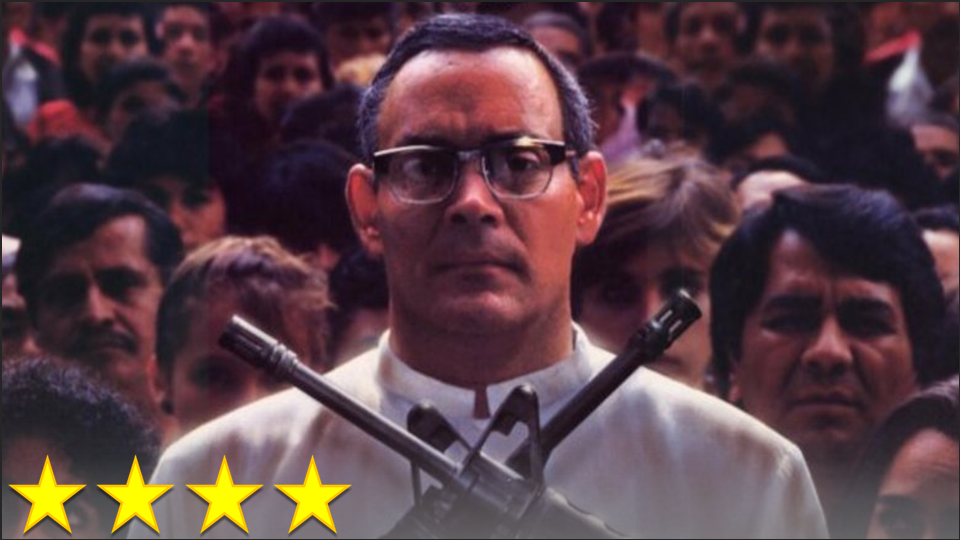I have decided to relieve myself of duty. For almost 21 months now, I have been reviewing every movie I watch for my first time, with only a few exceptions (such documentaries, or movies I have only seen through Mystery Science Theater and related productions). At this time, however, I am concluding this journey by ending the “mandatory” status of my online movie reviews. This is the 100th movie I have reviewed in this series, so it is a fitting place to end. Why is this particular film special enough to serve as the conclusion to an important chapter of my life’s story? Because I believe that experiencing Romero was a significant turning point in my life; for I now understand the nature of humankind.
Pardon me for being even more pretentious and over-dramatic than Romero itself, but this is a very telling film about what people always have done, and what we always shall do. What we see in this movie is the struggle to combat oppression. Over and over and over again, all throughout history, people are required to stand up and fight just to be called people. Humans are always finding new excuses to oppress people, as can be seen in just the recent history of Africa, Brazil, Panama, Cuba, and of course the United States, among several others that my readers will just have to research for themselves. I haven’t time to list every instance in the past century in which an entire populations have been denied their basic rights, and have been treated worse than animals.
This is what humans do. We harm without reason, we kill without cause, and we torture for pure pleasure. We silence those with whom we disagree and deafen ourselves with the gunshots that kill them. We invent new ways to kill more people more quickly, to hurt more people more violently. We dehumanize anyone we feel we must in order to manage our own fragile, pathetic emotions. This is what we do. This is what we are.
However, it is not all we are. What makes the human race such a fascinating species is not the fact that we are so oppressive and abusive that revolutions of liberation are commonplace, but rather the fact that we have made these revolutions commonplace by refusing to tolerate intolerance. People consistently demand liberty and are even willing to die in order to obtain liberty for the posterity of their people. If evil is in power, we will find a way to overthrow that power, no matter how long it takes us to do so. This is what we do.
This is what we are.
This movie contains many other elements that I could obviously discuss in more depth. The Hollywood white-washing is, of course, quite embarrassing, and the way that this movie cherry-picks information (such as the unsettling fact that the United States was supporting the oppressive government of El Salvador at the time by providing training and arms for the abusive soldiers) can be frustrating. I have little to add about any connection to certain characters in the story, and some of the characters were a mustache shy of a cartoon villain, but I will say that Raúl Juliá’s performance as Romero truly did move me. If one considers it to be a religious film – which I suppose is fair since it was produced in part by a Catholic production company – than it is certainly one of the best. It may be slow and boring at the start, but the more the film reveals about the evils humankind must endure, and about the powerful response humankind fires back at these evils, the more the viewer must appreciate the beauty of liberation.
